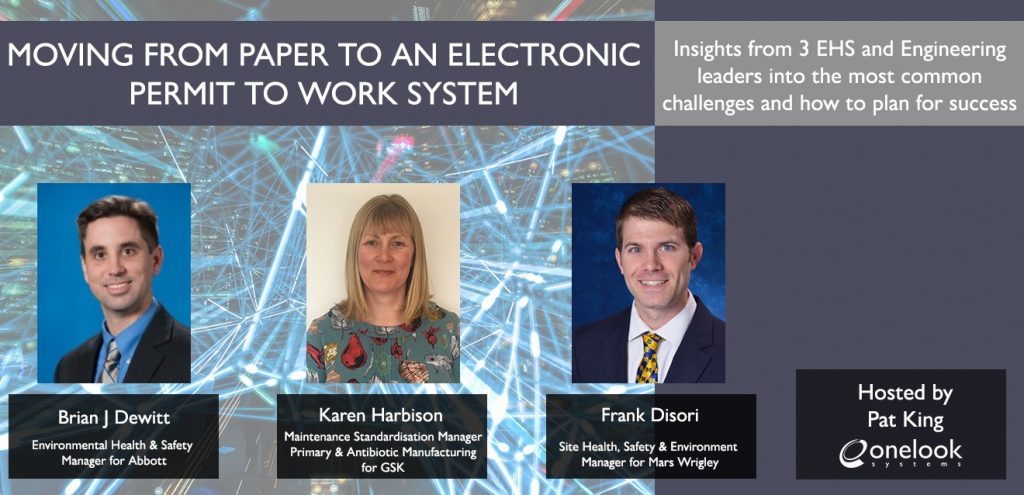Moving from Paper to An Electronic Permit to Work System
Sponsored Article
Insights from 3 EHS and engineering leaders into the most common challenges and how to plan for success.

Interviewee: Pat King, CEO of OneLook Systems
- What is this Panel Discussion all about?
It’s an opportunity for companies to hear the real story around what is involved in moving from a paper to an electronic Permit To Work system.
- Tell us a little bit more about the panellists.
We are very pleased to have panellists of the calibre of Karen Harbison (Maintenance Standardisation Manager, GSK), Frank Disori (Site Health, Safety & Environment Manager, Mars Wrigley), and Brian Dewitt (Environmental Health & Safety Manager, Abbott). This group represents senior engineers and EHS professionals from the world’s top Life Science and Food and Beverage companies. All three of the panellists have been involved with implementing electronic permit to work projects at an individual site level and across multiple sites around the world.
- Why is the topic relevant?
For many companies Permit To Work (PTW) is that last paper process and there is still a lot of uncertainty around what life is like after the permit books are gone. There is also some nervousness around how the project will impact daily operations – especially in busy manufacturing sites. Technology is constantly changing and improving, and with that people need to embrace change.
- Where did the idea for this Panel Discussion come about?
Part of the OneLook Systems implementation process is an in-depth communication plan that focuses on ensuring that there is a smooth transition from paper to electronic. Part of this communication plan includes internal webinars that allow different sites within an organisation to learn from other sites that have already gone live. It has been said by one of our customers that “if we had seen one of these webinars sooner, we would have had the confidence to move to an e-permit system much earlier”.
- Who is this discussion targeted at?
The event is relevant to any professional involved in health and safety, facilities, maintenance, engineering, contractor management, site leadership, continuous improvement, compliance, and those with an interest in improving their permitting processes.
- What are the key messages to be discussed during the event?
The panellists, with a combined 40 years of experience in EHS and Engineering, reveal what made them move away from paper processes and embrace electronic permit to work systems. Karen, Frank and Brian speak about the concerns they had in switching, but also how electronic permit to work has changed the future of contractor management in their respective organisations. They also offer their insights into how to approach funding approval, the key things to look for from a supplier, and the one tip that each would give for anyone considering making the switch.
- What do you hope will be the key takeaways for people who listen to the webinar?
That moving to an electronic system is extremely easy and that once it has been done everyone involved in the permit process will be amazed at how they ever managed to get by without it.
- How can people listen to the discussion?
Very simply, people can access this webinar by clicking on this link: https://webinar.onelooksystems.com/online-panel-event
OneLook Systems have set the standard in contractor management, visibility and permit to work software, developing SafePermit to address the risks companies face when bringing contractors onto a campus, site or office building. SafePermit focuses on the inefficiencies in the processes used to control contractors and safely manage work carried out to maintain operations.
Website: www.onelooksystems.com
Email:
